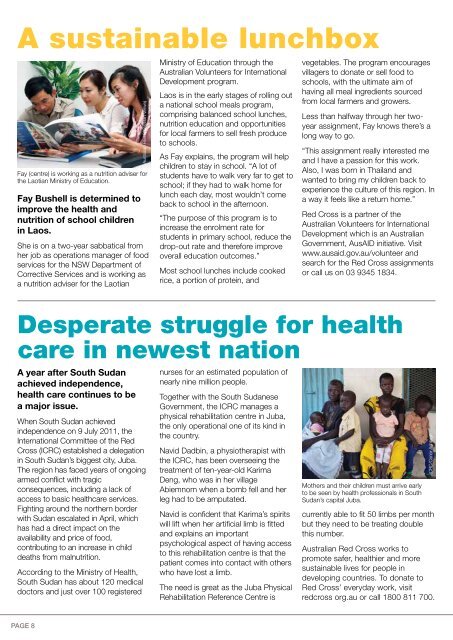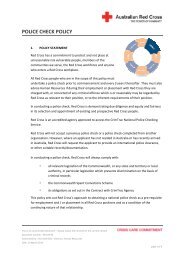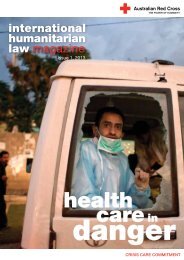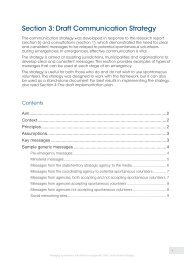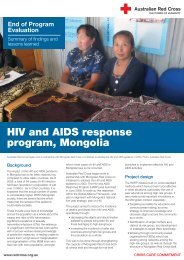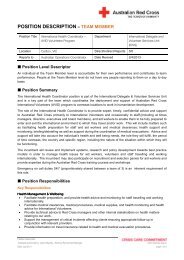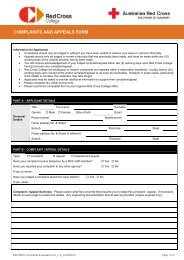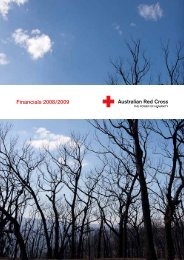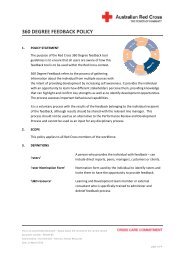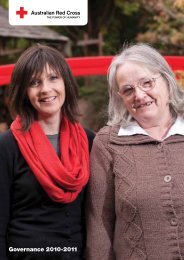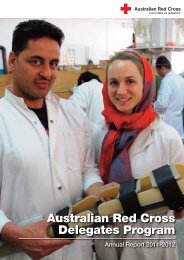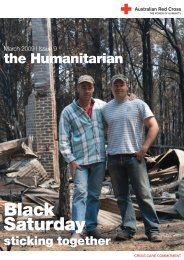WA - Australian Red Cross
WA - Australian Red Cross
WA - Australian Red Cross
You also want an ePaper? Increase the reach of your titles
YUMPU automatically turns print PDFs into web optimized ePapers that Google loves.
A sustainable lunchbox<br />
Fay (centre) is working as a nutrition adviser for<br />
the Laotian Ministry of Education.<br />
Fay Bushell is determined to<br />
improve the health and<br />
nutrition of school children<br />
in Laos.<br />
She is on a two-year sabbatical from<br />
her job as operations manager of food<br />
services for the NSW Department of<br />
Corrective Services and is working as<br />
a nutrition adviser for the Laotian<br />
<strong>Australian</strong> <strong>Red</strong> <strong>Cross</strong>/Bart Verweij<br />
Ministry of Education through the<br />
<strong>Australian</strong> Volunteers for International<br />
Development program.<br />
Laos is in the early stages of rolling out<br />
a national school meals program,<br />
comprising balanced school lunches,<br />
nutrition education and opportunities<br />
for local farmers to sell fresh produce<br />
to schools.<br />
As Fay explains, the program will help<br />
children to stay in school. “A lot of<br />
students have to walk very far to get to<br />
school; if they had to walk home for<br />
lunch each day, most wouldn’t come<br />
back to school in the afternoon.<br />
“The purpose of this program is to<br />
increase the enrolment rate for<br />
students in primary school, reduce the<br />
drop-out rate and therefore improve<br />
overall education outcomes.”<br />
Most school lunches include cooked<br />
rice, a portion of protein, and<br />
vegetables. The program encourages<br />
villagers to donate or sell food to<br />
schools, with the ultimate aim of<br />
having all meal ingredients sourced<br />
from local farmers and growers.<br />
Less than halfway through her twoyear<br />
assignment, Fay knows there’s a<br />
long way to go.<br />
“This assignment really interested me<br />
and I have a passion for this work.<br />
Also, I was born in Thailand and<br />
wanted to bring my children back to<br />
experience the culture of this region. In<br />
a way it feels like a return home.”<br />
<strong>Red</strong> <strong>Cross</strong> is a partner of the<br />
<strong>Australian</strong> Volunteers for International<br />
Development which is an <strong>Australian</strong><br />
Government, AusAID initiative. Visit<br />
www.ausaid.gov.au/volunteer and<br />
search for the <strong>Red</strong> <strong>Cross</strong> assignments<br />
or call us on 03 9345 1834.<br />
Desperate struggle for health<br />
care in newest nation<br />
A year after South Sudan<br />
achieved independence,<br />
health care continues to be<br />
a major issue.<br />
When South Sudan achieved<br />
independence on 9 July 2011, the<br />
International Committee of the <strong>Red</strong><br />
<strong>Cross</strong> (ICRC) established a delegation<br />
in South Sudan’s biggest city, Juba.<br />
The region has faced years of ongoing<br />
armed conflict with tragic<br />
consequences, including a lack of<br />
access to basic healthcare services.<br />
Fighting around the northern border<br />
with Sudan escalated in April, which<br />
has had a direct impact on the<br />
availability and price of food,<br />
contributing to an increase in child<br />
deaths from malnutrition.<br />
According to the Ministry of Health,<br />
South Sudan has about 120 medical<br />
doctors and just over 100 registered<br />
nurses for an estimated population of<br />
nearly nine million people.<br />
Together with the South Sudanese<br />
Government, the ICRC manages a<br />
physical rehabilitation centre in Juba,<br />
the only operational one of its kind in<br />
the country.<br />
Navid Dadbin, a physiotherapist with<br />
the ICRC, has been overseeing the<br />
treatment of ten-year-old Karima<br />
Deng, who was in her village<br />
Abiemnom when a bomb fell and her<br />
leg had to be amputated.<br />
Navid is confident that Karima’s spirits<br />
will lift when her artificial limb is fitted<br />
and explains an important<br />
psychological aspect of having access<br />
to this rehabilitation centre is that the<br />
patient comes into contact with others<br />
who have lost a limb.<br />
The need is great as the Juba Physical<br />
Rehabilitation Reference Centre is<br />
Mothers and their children must arrive early<br />
to be seen by health professionals in South<br />
Sudan’s capital Juba.<br />
currently able to fit 50 limbs per month<br />
but they need to be treating double<br />
this number.<br />
<strong>Australian</strong> <strong>Red</strong> <strong>Cross</strong> works to<br />
promote safer, healthier and more<br />
sustainable lives for people in<br />
developing countries. To donate to<br />
<strong>Red</strong> <strong>Cross</strong>’ everyday work, visit<br />
redcross org.au or call 1800 811 700.<br />
ICRC/Conor Ashleigh<br />
PAGE 8


